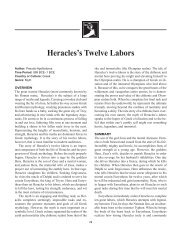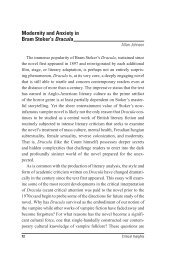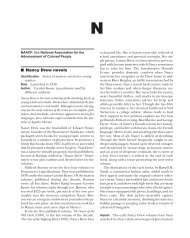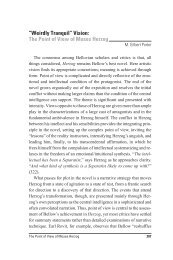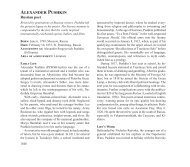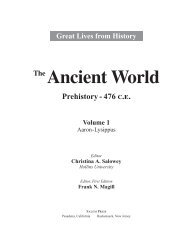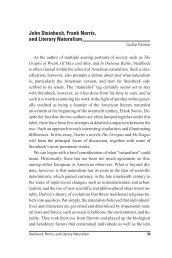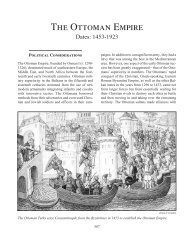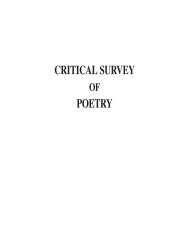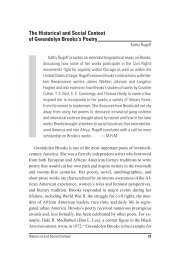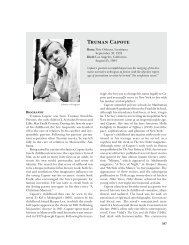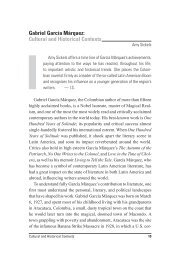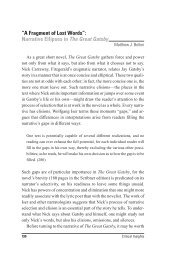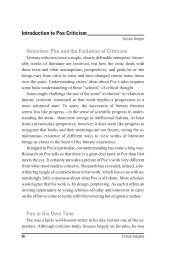Catcher in the Rye.vp - Salem Press
Catcher in the Rye.vp - Salem Press
Catcher in the Rye.vp - Salem Press
Create successful ePaper yourself
Turn your PDF publications into a flip-book with our unique Google optimized e-Paper software.
Notes<br />
1. The sociologically oriented reader is doubtless tempted to relate Holden’s <strong>in</strong>stability<br />
to ano<strong>the</strong>r cause, <strong>the</strong> Caulfield’s ra<strong>the</strong>r improvised homelife—<strong>the</strong> mo<strong>the</strong>r be<strong>in</strong>g<br />
a cha<strong>in</strong>-smok<strong>in</strong>g <strong>in</strong>somniac and <strong>the</strong> fa<strong>the</strong>r an ex-Catholic and peripatetic lawyer. But<br />
Sal<strong>in</strong>ger nei<strong>the</strong>r suggests that this home environment is abnormal <strong>in</strong> our time nor that it<br />
has played a decisive part <strong>in</strong> mould<strong>in</strong>g Holden’s acutely sensitive reactions to <strong>the</strong><br />
world. In virtually all of Sal<strong>in</strong>ger’s fiction, for that matter, <strong>the</strong> parents are relegated to a<br />
humiliat<strong>in</strong>g role of <strong>in</strong>significance <strong>in</strong> <strong>the</strong> lives of <strong>the</strong>ir precocious children.<br />
2. The <strong>Catcher</strong> <strong>in</strong> <strong>the</strong> <strong>Rye</strong> (New York, 1953), pp. 153, 154. All subsequent quotations<br />
are taken from this edition.<br />
3. Two <strong>in</strong>terpretations of <strong>the</strong> carrousel present a less optimistic view of Holden’s<br />
progress. Edgar Branch writes that <strong>the</strong> carrousel “goes round and round, go<strong>in</strong>g nowhere—a<br />
dynamic moment of happy, static immaturity eternalized <strong>in</strong> his m<strong>in</strong>d.”<br />
(“Mark Twa<strong>in</strong> and J. D. Sal<strong>in</strong>ger: A Study <strong>in</strong> Literary Cont<strong>in</strong>uity,” American Quarterly,<br />
IX, Summer, 1957, 149.) Arthur Heiserman and James E. Miller, Jr., hold out<br />
even less hope for Holden: “So at <strong>the</strong> end, like <strong>the</strong> hero of Antic Hay, Holden delights<br />
<strong>in</strong> circles—a comfort<strong>in</strong>g, bounded figure which yet connotes hopelessness. . . . From<br />
that lunatic delight <strong>in</strong> a circle, he is shipped off to <strong>the</strong> psychiatrist. For Holden loves<br />
<strong>the</strong> world more than <strong>the</strong> world can bear.” (“J. D. Sal<strong>in</strong>ger: Some Crazy Cliff,” Western<br />
Humanities Review, X, Spr<strong>in</strong>g, 1956, 131.)<br />
4. Charles Kaplan, “Holden and Huck: The Odysseys of Youth,” College English,<br />
XVIII (November, 1956), 78.<br />
5. Branch, op. cit., p. 156.<br />
6. Heiserman and Miller, op. cit., p. 134.<br />
7. Critical op<strong>in</strong>ion here aga<strong>in</strong> has <strong>in</strong>sisted that Holden rema<strong>in</strong>s a confirmed isolate<br />
at <strong>the</strong> end of <strong>the</strong> book. Alfred Kaz<strong>in</strong> <strong>in</strong>cludes Holden <strong>in</strong> <strong>the</strong> sweep<strong>in</strong>g pronouncement<br />
that “<strong>in</strong> Sal<strong>in</strong>ger’s work <strong>the</strong> two estates—<strong>the</strong> world and <strong>the</strong> cutely sensitive<br />
young—never really touch at all.” (“J. D. Sal<strong>in</strong>ger: ‘Everybody’s Favorite,’” repr<strong>in</strong>ted<br />
<strong>in</strong> Contemporaries, Boston, 1962, p. 238.) For Maxwell Geismar, Holden’s statements<br />
represent <strong>the</strong> smugly removed “peak of well-to-do and neurotic anarchism.” (“J. D.<br />
Sal<strong>in</strong>ger: The Wise Child and <strong>the</strong> New Yorker School of Fiction,” <strong>in</strong> American Moderns:<br />
From Rebellion to Conformity, New York, 1958.) Peter J. Seng, o<strong>the</strong>rwise perceptive<br />
<strong>in</strong> not<strong>in</strong>g Holden’s obvious <strong>in</strong>capacity to act as an arbiter of moral values <strong>in</strong> an<br />
adult society, <strong>in</strong>sists that Holden at <strong>the</strong> end is <strong>the</strong> tragic author of his own undo<strong>in</strong>g.<br />
Holden’s “flaw” resides <strong>in</strong> “a naïve refusal to come to terms with <strong>the</strong> world <strong>in</strong> which he<br />
lives.” (“The Fallen Idol: The Immature World of Holden Caulfield,” College English,<br />
XXIII, December, 1961, 209.)<br />
8. Authors Heiserman and Miller, op. cit., p. 137, come ra<strong>the</strong>r close to such a conclusion:<br />
“As we leave Holden alone <strong>in</strong> his room <strong>in</strong> <strong>the</strong> psychiatric ward, we are aware<br />
of <strong>the</strong> book’s last ironic <strong>in</strong>congruity. It is not Holden who should be exam<strong>in</strong>ed for a<br />
sickness of <strong>the</strong> m<strong>in</strong>d, but <strong>the</strong> world <strong>in</strong> which he has sojourned and found himself an<br />
alien. To ‘cure’ Holden, he must be given <strong>the</strong> contagious, almost universal disease of<br />
phony adultism; he must be pushed over that ‘crazy cliff.’”<br />
Symbolic Resolution <strong>in</strong> The <strong>Catcher</strong> <strong>in</strong> <strong>the</strong> <strong>Rye</strong> 305



